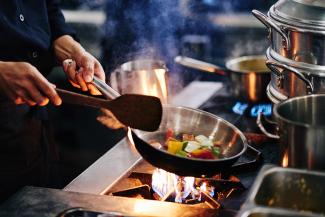The Ecology Center Healthy Stuff Lab is helping get toxic chemicals out of our everyday environments because everyone deserves healthy stuff and a healthy environment.
The Ecology Center's Healthy Stuff Lab's stance is simple: Toxic chemicals have no place in our everyday products or our natural environment. To that aim, our science-based advocacy is having rippling effects on non-toxic policies across the country and in the marketplace.
Thanks to our Healthy Stuff Lab team, more brands are ditching PFAS in favor of non-toxic alternatives in pots, pans, and baking dishes. The Ecology Center's 2020 report "What's Cooking?" revealed undisclosed PFAS coatings in cookware. Nearly 80% of cookware and 20% of bakeware we tested had a PTFE coating, which is a type of PFAS. Moreover, our Ecology Center researchers found it was common to see PTFE-coated pans labeled PFOA-free. This labeling can be misleading because shoppers may assume 'PFOA-free' means 'PFAS-free.'
California legislators, after being made aware of the study findings, created a requirement for manufacturers to disclose the presence of PFAS in cookware. The resulting law helps prohibit misleading claims. Since the passage of California's Safer Food Packaging and Cookware Act of 2021, several other states have enacted laws to restrict the use of PFAS in cookware and other consumer products.
This set in motion a response by American manufacturers and retailers to curtail PFAS use in cooking and baking items. Minnesota-based Nordic Ware, the company that gave us the bundt cake pan in 1950, introduced a line of non-coated cookware in 2022. Target has set a goal to "remove intentionally added per- and polyfluorinated alkyl substances (PFAS) from owned brand products" by 2025, including cookware.
If it's not safe enough for the birds, it's not safe enough for you.
When used properly, a quality stainless steel pan has better non-stick performance than any disposable coated pan. I'm not an expert on whether or not coated cookware is safe for you, but I know there is zero reason to take the risk when there is a proven and safer alternative to do the same task without the risk. Don't believe me? Ask any bird owner why they don't use coated cookware in their home. Funny story: a few years ago, we discovered that one of our best-used search terms was from bird owners seeking "bird-safe cookware!" - Bryan Hurley, Founder CEO Americraft and 360 Cookware
These victories and our mission to phase out nonessential uses of PFAS are part of a more significant movement away from PFAS worldwide. For example, Swedish giant IKEA announced the launch of new cookware with a non-PTFE, silica-based non-stick coating. The introduction of these products is part of the company's larger goal to phase out PFAS chemicals by 2026 from all cook and bakeware.
The influence of the Ecology Center's PFAS in pans report shows how a little lab in the Midwest can inspire policy and industry change across the country– helping to keep hazardous chemicals out of the kitchen and off your plate.
However, there is still much to do to work towards healthy people and a healthy planet. Michigan has an opportunity to protect communities from harmful PFAS exposure by passing HB5657: The Hazardous Products Act. The Hazardous Products Act would go a long way toward turning off the tap on PFAS.
Urge your representative to pass Michigan House Bill 5657: Hazardous Products Act.



